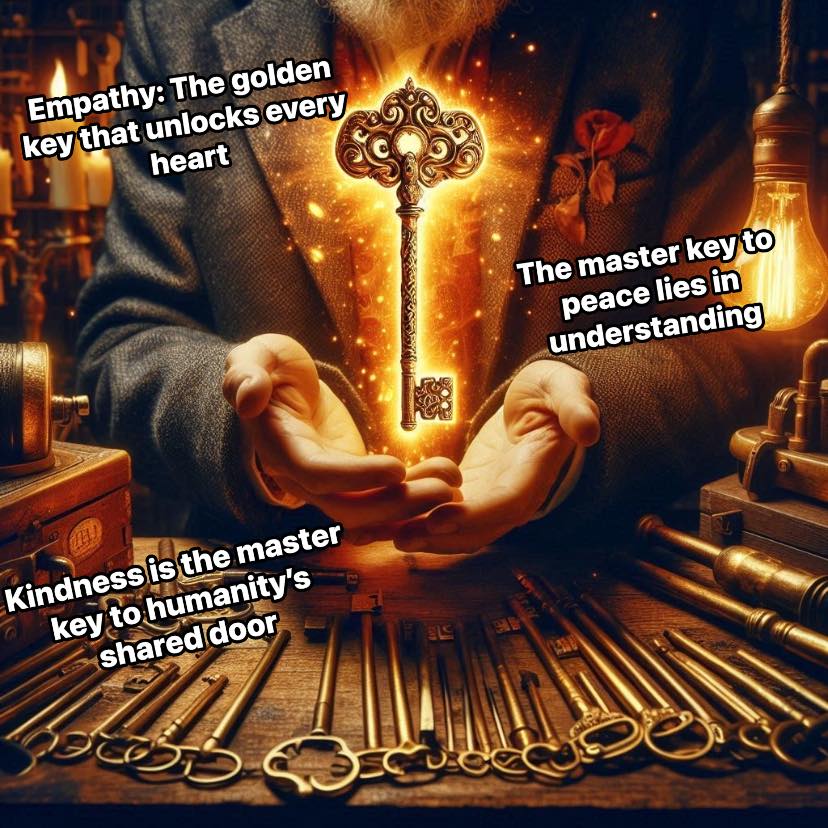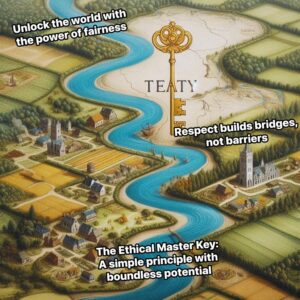
In a quiet village nestled between rolling hills and dense forests, there lived an old locksmith named Elias. Known for his unparalleled skill, Elias could craft keys for any lock, no matter how intricate or ancient. But his most prized creation wasn’t a key of metal—it was a philosophy he called The Ethical Master Key.
Elias often told stories to the villagers about a key that could open every door, not by force or trickery, but by the simple act of understanding and compassion. “This master key,” he would say, “is forged in the fires of empathy and tempered with the golden rule: treat others as you would want to be treated.”
Many in the village dismissed his words as the musings of an eccentric old man, but a few listened closely. Among them was a young woman named Amara, who admired Elias’s wisdom. She often visited his workshop, watching as he meticulously crafted keys while sharing tales of how this ethical principle could transform lives.
One fateful day, the peace of the village was shattered. Two neighboring kingdoms, divided by a river that cut through the village, began to quarrel over its waters. Soldiers marched in, each side claiming ownership, and soon the once-harmonious community was caught in the crossfire of greed and distrust.
Amara, desperate to restore peace, turned to Elias for guidance. “What can I do?” she asked. “The river belongs to neither side yet serves us all. How do we make them see that?”
Elias handed her a small, intricately carved golden key and said, “This is not a key for any door, but a symbol. Take it to the kings and tell them the story of the Ethical Master Key. Make them understand that to open the door to peace, they must treat the other as they wish to be treated.”
Skeptical but determined, Amara set off to meet the two kings. At the first castle, she approached the stern ruler and asked, “If the river belonged to your people alone, how would you want your neighbor to treat you? Would you want them to respect your claim or fight to take it back?”
The king, taken aback by the simplicity of the question, muttered, “I would hope for respect and fairness.”
Amara nodded. “Then treat your neighbor the same.”
She traveled to the second kingdom and posed the same question. The other king, though stubborn at first, eventually conceded that peace was preferable to conflict. Amara then presented the golden key and told them Elias’s tale of the master key. She explained that this key represented a shared understanding: the willingness to empathize and act with fairness.
Moved by her words, the kings agreed to meet at the riverbank. There, they crafted a treaty that recognized the river as a shared resource, belonging not to one kingdom but to the earth and all its people. The village rejoiced as soldiers laid down their arms and the kings exchanged respectful bows.
When Amara returned to Elias, she found his workshop empty. A note lay on his workbench, written in his elegant hand:
“You have forged your own master key, Amara. The true locksmith is the one who opens hearts, not doors.”
From that day on, the village prospered, and Amara became a renowned ambassador of peace, spreading the wisdom of the Ethical Master Key to far-off lands. Her efforts inspired countless others to treat one another with empathy, respect, and kindness, unlocking the doors to a more harmonious world.
The story of Amara and Elias became legend—a testament to the universal truth that, with empathy as the master key, no door remains closed.


